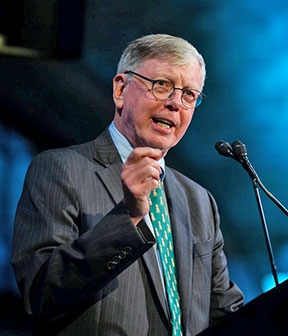Robert Hayes ’77 works to ensure access to healthcare and other services for vulnerable populations
Robert Hayes ’77 first became interested in issues affecting the homeless population as a young reporter covering social issues for the Long Island Catholic Newspaper. Then, as a student at NYU Law, Hayes struck up conversations with the men whom he noticed appeared to be living in Washington Square Park. At a time when many considered homelessness to be a choice, those interactions were illuminating, he says: “I got to understand that people were living on the streets because there was nowhere else to go.”
Hayes went on to argue the case that established New York state’s obligation to provide adequate shelter for homeless men, and to found the Coalition for the Homeless, a nonprofit that provides legal, medical, and other services while advocating for policy change. During his career, which has encompassed both public interest and private sector work, Hayes has fought to expose and address the many factors that prevent vulnerable populations, particularly homeless populations, from accessing basic services. Now the president and CEO of Community Healthcare Network, a nonprofit that operates 14 community health centers across New York City, Hayes says he is still endeavoring to address the overlapping factors that keep people from sustainable wellness.
“Healthy housing to me is healthcare. Food security is healthcare. Addressing the racial disparities that result in police violence is healthcare. And increasingly, folks are understanding that these social determinants need to be addressed for lasting positive outcomes,” says Hayes.
After law school, Hayes took a job as an associate at Sullivan & Cromwell while remaining interested in improving the lives of the homeless people in his neighborhood. Working pro bono, Hayes filed a class action suit, Callahan v. Carey, on behalf of a number of homeless men who lived near the Bowery, who he believed were being deprived the adequate shelter guaranteed in the New York State Constitution. “I spent some time in the NYU Law library,” Hayes says. In 1979 a New York State Supreme Court judge found for the plaintiffs, but it took two years of negotiations between the plaintiffs, city, and state to reach a consent decree that obligated the state of New York to provide adequate food and shelter to all homeless men who applied for it, and also set standards for the quality and range of accommodations required in shelters.
“After the story of the decree hit the front page of the New York Times, there was a flurry of interest from across the country,” Hayes says. “People were asking ‘What can we do? We are having these problems too: Can you help us?’ And that's when I realized I probably could be more useful starting Coalition for the Homeless than being yet another able associate at Sullivan & Cromwell.”
In 1982, Hayes partnered with an anthropologist and a social worker to create the Coalition. Initially addressing the needs of homeless people in New York, the Coalition for the Homeless is now national, and provides services like job placement and training, resources for permanent housing, and emergency food and clothing, while also lobbying and advocating for federal policy changes to increase ease of access to government resources. In 1985, Hayes was awarded a MacArthur Fellowship for his work.
“Bob has always been on the cutting edge,” says Tim O’Connor ’77, who was Hayes’s roommate during their 2L year. “He is the most efficient person I’ve ever met—smart and driven, and always focused on how he could use these skills to help other people. I think if you look at how willing he is to adapt his career to help people who need his skillset, you’ll really see that.”
After nearly a decade running the Coalition for the Homeless, Hayes says he missed practicing law. He moved to O’Melveny & Myers as special counsel, specializing in corporate litigation and employment law as well as handling what he calls “a substantial poverty practice” pro bono. Nine years as director of Moon, Moss, McGill, Hayes & Shapiro in Portland, Maine followed, as he and his wife raised their three daughters.
In 2001, Hayes moved into the healthcare space, accepting a position as general counsel and president of the Medicare Rights Center in New York, which he held for seven years. “I wanted to get back into the activist fray,” says Hayes. He then served for six years as senior vice president of health quality for Universal American, a Fortune 500 health insurance company, before accepting the CEO position at Community Healthcare Network in 2015.
“[Community Healthcare Network] is an amazing group of people who do community health work, particularly concentrated on the needs of poor folks and people of color—people who have been often neglected by healthcare in implicit and explicit ways” says Hayes, noting that illnesses that result in hospitalization are often a result of larger, systemic issues, like lack of permanent housing.
In leading the organization, Hayes says, he draws upon the skills and curiosity that he honed as a reporter in order to help address the network’s most pressing needs. “[It] goes back to being a journalist—a journalist, at your core, is asking questions and not relying on your own knowledge, but finding other people to give you knowledge,” he says, “and it is an advantage in terms of having open ears, as a way to conduct leadership—allowing those who know the most to offer solutions.” Since the COVID-19 pandemic began, Community Healthcare has been working to offer broad “telehealth” care, including the ability to see medical professionals over video. That has led Hayes to focus on ensuring that the most vulnerable communities have access to video-capable devices.
“We are doing the best we can to diminish this ‘digital divide’ that separates those who don’t own or have access to technology from receiving the healthcare they need,” says Hayes.
Posted October 21, 2020


